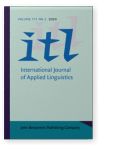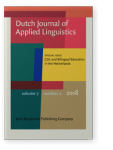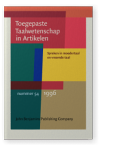Ron Oostdam
List of John Benjamins publications for which Ron Oostdam plays a role.
2020 The effects of instructional focus and task type on pre-vocational learners’ ability in EFL oral interaction ITL - International Journal of Applied Linguistics 171:2, pp. 153–190 | Article
Little is known about the effect of diverging pedagogies on the development of interactional oral skills in a foreign language. In a controlled study, we evaluated three newly developed instructional programmes that were situated in the same training context, but that differed in instructional… read more
2018 Juggling ideals and constraints: The position of English teachers in CLIL contexts CLIL and Bilingual Education in the Netherlands, Mearns, Tessa and Rick de Graaff (eds.), pp. 177–202 | Article
In bilingual streams in the Netherlands, school subjects are taught in an additional language so that pupils learn both subject content and the target language by using language meaningfully. Teachers of English in bilingual streams (TEBs) are often expected to collaborate with subject teacher… read more
2018 Content and Language Integrated Learning in Dutch bilingual education: How Dutch history teachers focus on second language teaching CLIL and Bilingual Education in the Netherlands, Mearns, Tessa and Rick de Graaff (eds.), pp. 156–176 | Article
This small-scale observational study explores how Dutch bilingual education history teachers (BHTs) focus on the L2 component in their CLIL-lessons. We observed and rated eight BHTs on five language teaching categories. Results show that Dutch BHTs focus more strongly on using the L2 to teach… read more
1996 Strategie-Onderwijs in Mondelinge Taalvaardigheid Spreken in moedertaal en vreemde taal, pp. 93–102 | Article
It is assumed that language education can gain considerable profit when more attention is given to the process of language learning and processing. In other words, it is not enough to look at what pupils are doing, but also at how they are doing it. More attention to the process means a shift… read more


